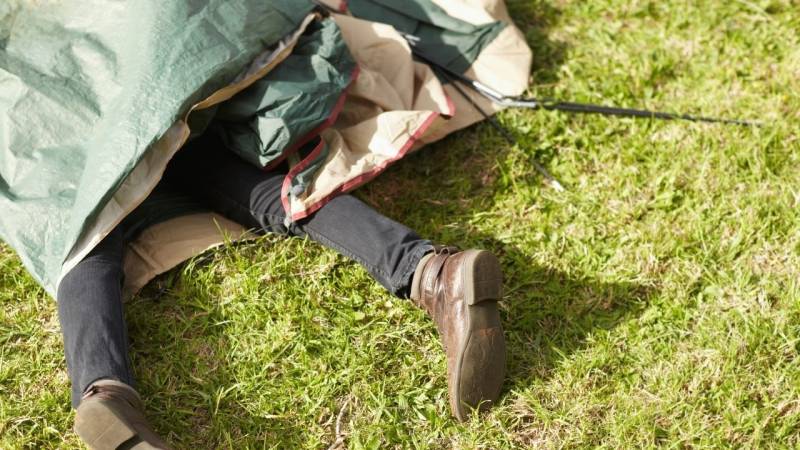
The 25 biggest camping mistakes that you should avoid as a beginner
👉 The key facts from this guide
- Inform yourself about the camping site: You should inform yourself about your camping destination before your trip to ensure that you know what to expect and what to bring.
- Test your equipment: Before going camping, you should test all of your camping gear to ensure that everything works and you know how to use it.
- Pack the right utensils: It is important to pack all necessary equipment, including a tent, sleeping bag, first aid kit, headlamp, and cooking equipment.
- Be prepared for the weather: Familiarize yourself with the weather conditions of the camping location to ensure that you pack the appropriate gear and clothing.
- Avoid leaving food unattended: This can attract animals and lead to problems. Always pack your food securely and do not leave it unattended.
- Follow the "Leave No Trace" principles: Do not leave any trash or other traces of your stay. Be a responsible camper and respect nature.
Let's be honest, we've all been camping beginners and made a few mistakes along the way.
I remember my very first camping trip, which wasn't that great.
He was funny, but looking back, I realize that I should have done some things differently.
And now that I know better, I at least avoid all the unnecessary mistakes that most camping beginners make.
The mistakes I made on my first camping trips, I can't change.
But I can pass on the tips I learned while camping to others.
If you're going camping for the first time or just want to get some information on what to do and what not to do, here are the biggest mistakes you should avoid while camping.
The biggest camping mistakes to avoid
I will list only the worst mistakes that can happen to you while camping.
Some are still bearable, but some are life-threatening.
Especially beginners when camping makes these mistakes.
But even advanced learners don't think of everything. Therefore, be sure to read the list all the way to the end.
1. The campsite not explored
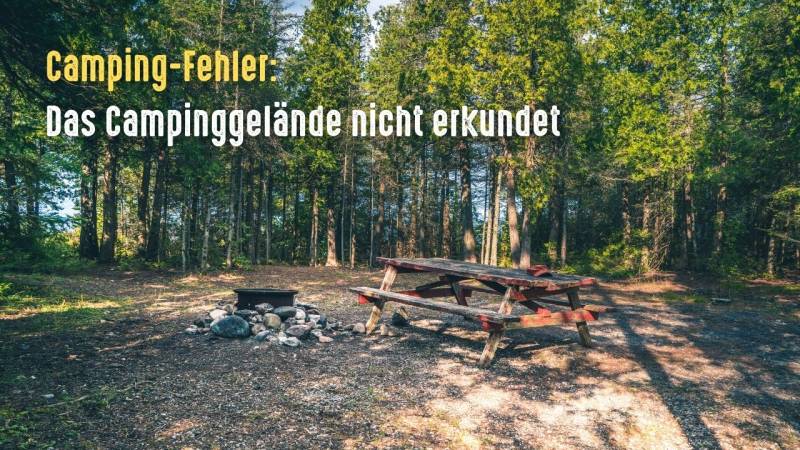
One of the biggest camping mistakes you can ever make is not researching your camping destination before your trip.
You don't have to research for hours, but good knowledge of the travel destination is important.
Pay attention to:
- on the facilities of the campsite
- what other campers have said about the place
- how to get there
- and everything that interests you and you need to know
So you know exactly what you need to pack and what you don't need.
In addition, you will learn how to best book a spot at the campsite, whether you need to make a reservation in advance or if it's okay to just show up.
2. Arriving at the campsite too late
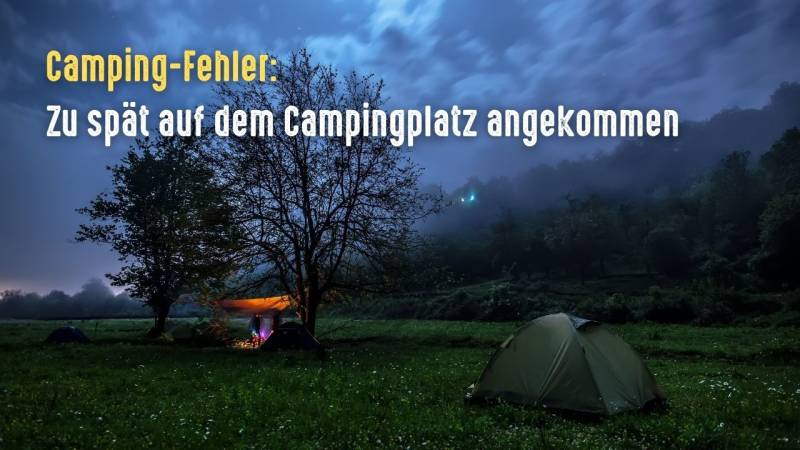
Arriving late at the campsite is a miserable idea.
It's no fun setting up the tent in the dark, preparing the equipment, and - even worse - finding a suitable place to camp.
Especially when it is a popular campsite where many campers are already staying.
The worst thing is when there is no more space, and you have to switch to another campsite.
Or when the reception is closed, and you can't book a spot even though one is available.
Believe me, this is not funny at all, and you would rather not deal with all the hustle and bustle - especially if you're camping for the first time.
Plan your day so that you arrive at the campsite during the day. This way, there is enough time to get everything in order instead of panicking and rushing around in the dark.
Read also: 5 tips for arriving at the campsite at night
3. Camping equipment not tested before departure
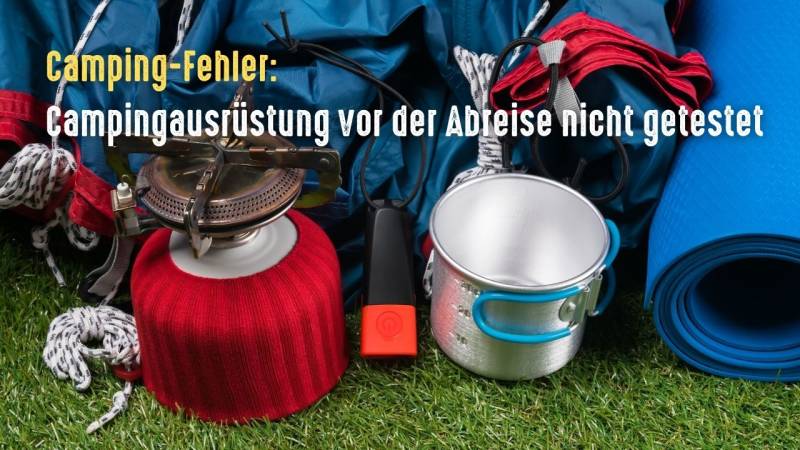
Before you go camping, you should definitely test all of your camping equipment.
This ensures that you can operate each individual part or that everything functions as expected.
It would be a shame if you arrive at the campsite and don't know how to set up a tent or use other useful camping utensils.
Most camping beginners assume that they can follow the instructions on site.
That may be effective, but do you want to spend two hours with a manual when you're out in nature?
You better use your time for exciting activities instead of trying to figure out how an object works.
It gets even worse if you can't even manage to set up your tent with the help of the instruction manual.
So make sure to test out all of your camping equipment before heading out into the great outdoors.
Read also: Stop struggling with your tent: What beginners need to know about setting up a tent
4. Forgetting to pack the most important camping utensils
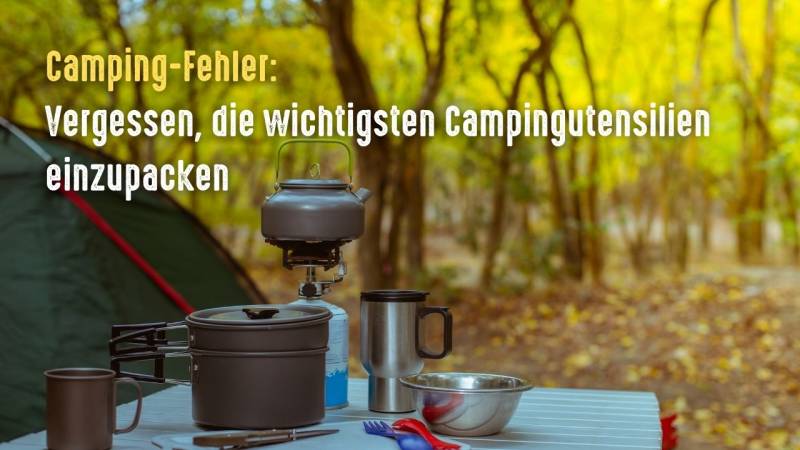
Another big mistake that new campers will make: They don't pack some important equipment.
This can happen because either you don't know what to pack - or because you wanted to travel with light luggage.
However, the lack of essential items can lead to serious problems when exploring the wilderness.
- Imagine you hurt yourself or cut yourself. And then you realize that you didn't pack your first aid kit.
- Or you run out of clean drinking water, and you remember that you didn't pack a water filter.
- Or it gets cold at night and the wool blanket is still at home and not over your sleeping bag.
This can be terrible. Especially when there is no way to get these things anywhere nearby.
I suggest creating your own camping equipment checklist (here's my guide) with all the essential items you need, so you don't forget anything.
And while you're at it, here are some of the most important camping utensils you should pack.
- Camping Tent: Take a tent that is big enough for the people you are camping with. It should also be sturdy enough to withstand wind and rain. I also recommend getting a tent that is large enough to accommodate your gear. A two-person tent is designed for two people, but not for your gear. So it's better to get a three-person tent. Want to buy a tent? Then read this ultimate guide to tents.
- Sleeping Bag: You definitely need one because it gets cool at night. Don't skimp on a sleeping bag, but rather choose one from my top list of sleeping bags that is super warm and comfortable.
- Sleeping Pad: Imagine the cool ground as a vacuum cleaner that sucks away your body heat. And now that you have that image in your head, you also know why you should never camp without a sleeping pad. In my sleeping pad buying guide, I'll show you the best models.
- First Aid Kit: When you're out in nature, there can be a number of minor accidents and cuts. That's why you should make sure you have a first aid kit before you leave. Ideally, you put together your own first aid kit, or you can take this pre-made kit.
- Headlamp: It's very likely that there won't be any electricity at the campsite, so take a powerful headlamp like this one.
- Camping Stove: Since you'll be preparing your food, it's important to bring a stove. This gas stove is small but performs well outdoors.
These are just some of the most important camping items, so you better check out my comprehensive camping packing list that includes everything you need in the great outdoors.
5. Packed too many things
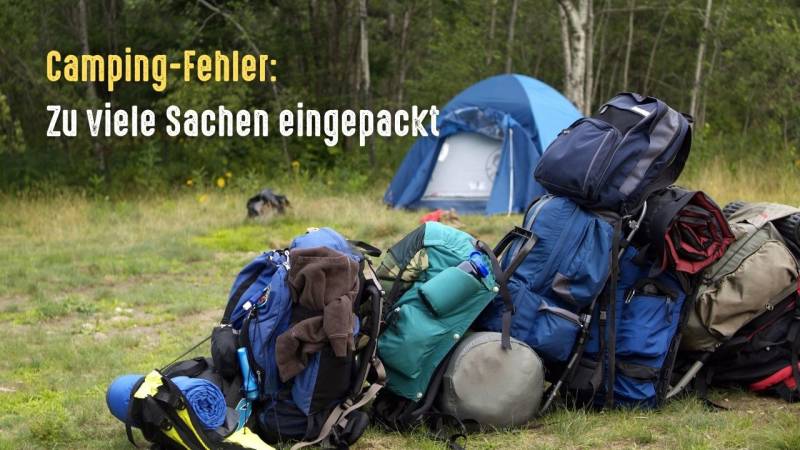
If we're already packing, that doesn't mean you have to bring your whole house for a few days of camping adventures.
Most campers make the mistake of packing too much. I know this from my own experience: I used to be afraid of not having everything necessary in the wilderness.
This resulted in me carrying around everything unnecessary, which became a burden.
Of course, you should take everything you need, but as a rule of thumb: Only take things with you that you can use for multiple purposes, and replace your heavy items with lightweight ones.
And if there is the possibility of a compressible travel article, opt for it instead of a rigid one.
This way, you save space and also reduce the weight of your entire backpack.
Read also
8 reasons why camping alone can be great - When you go camping alone, you can do whatever you want. You don't have to compromise, and you don't have to wait. Here are 8 reasons why solo camping is worth it.
6. Didn't assess the weather properly before the trip
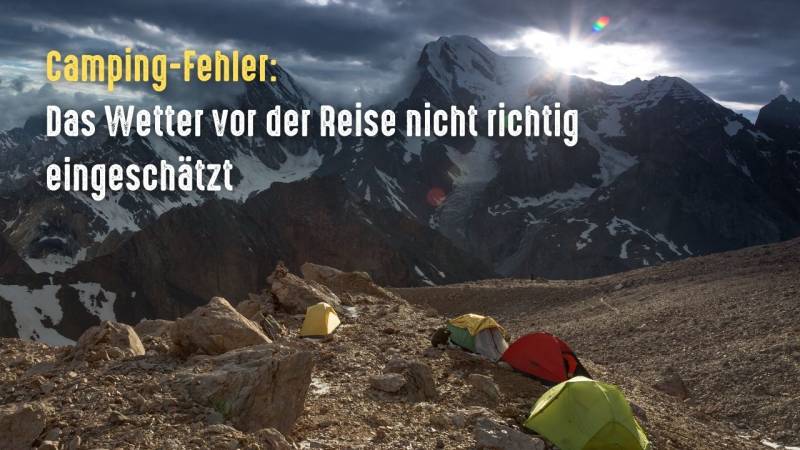
The biggest mistake you can make while camping is not informing yourself about the weather conditions of the place where you want to camp.
I cannot emphasize enough how important it is to know the weather. Make the weather forecast your friend, as it is essential when it comes to making important decisions.
My tip: Also acquire the skills to interpret the weather by observing nature. Animals, plants, and clouds are great indicators.
If it's snowing, raining, or sunny, you know exactly what equipment and clothing you need to pack. And you can plan your activities well instead of being surprised by Mother Nature.
Read also
The 11 most common fears of camping and how to overcome them - Camping can be a rewarding activity, but it can also be scary. Let's examine the most common fears when camping and how to overcome them.
7. Not enough warm clothing and sleeping gear packed
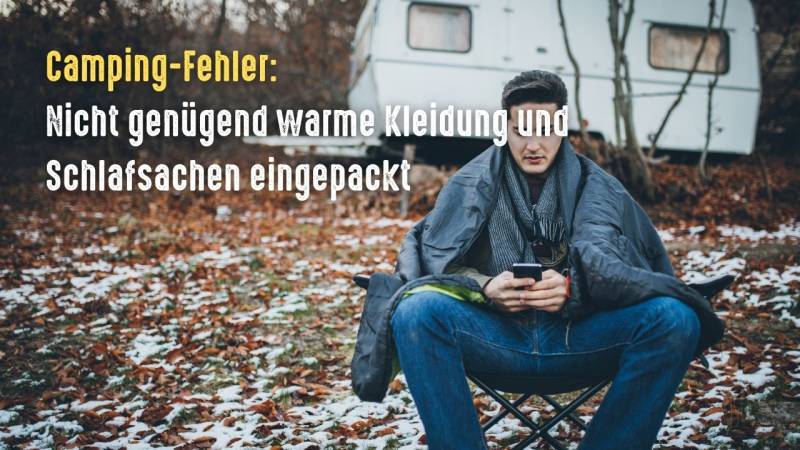
Regardless of the weather, it gets very cold at night when camping in the great outdoors. It would be a mistake not to bring a warm sleeping bag assuming that it won't get cold at night.
Even in the warm months, you should pack a warm fleece blanket for the cold nights and don't forget your raincoat/poncho, as the weather can change drastically in some places.
Whether it's cotton, merino wool, or nylon: Take a look at my guide for choosing the right clothing - afterward you will have a better understanding.
But don't forget the super warm and comfortable sleeping bag.
Staying warm in the tent and not freezing is one of the top priorities.
Beginners often tend to ignore clothing and equipment for the cool night in warm countries or places.
But regardless of the temperatures, warm clothing and blankets are among the most important camping essentials - and it would be a big mistake not to pack them.
Reading tip: The best sleeping bags for camping
8. Food left unattended at the campsite
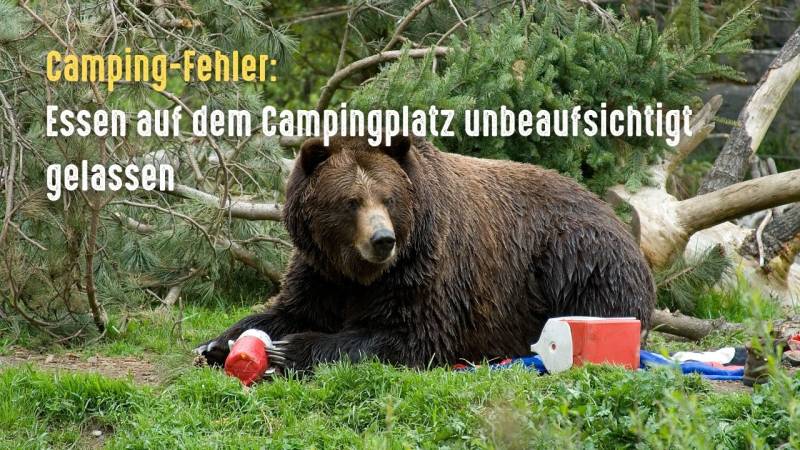
Camping means cooking outdoors, and this open space is shared with other wild animals. This may sound like a small mistake, but in reality, it is a big one.
If you leave your food unattended, it can attract animals to the campsite.
Aside from losing your food to cunning raccoons or foxes, you could also attract other dangerous animals like bears (in other countries).
Remember that it is not allowed to feed wild animals with human food - they can die from it.
Always pack your food away properly.
9. Forgot to learn survival techniques
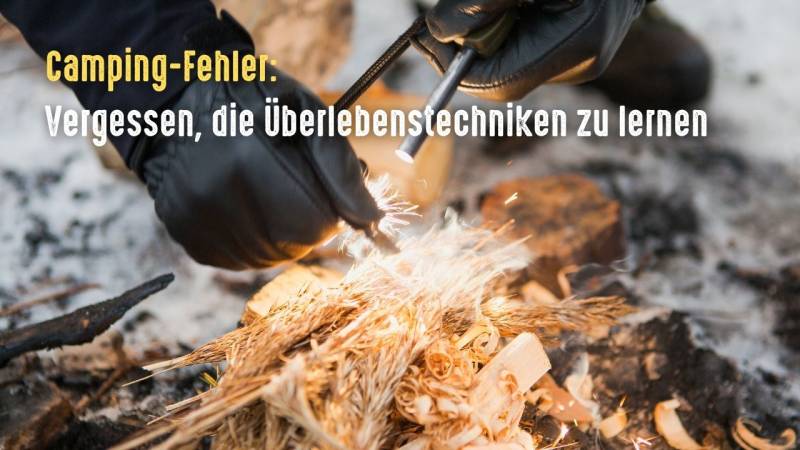
Being in the great outdoors sometimes means being exposed to a series of challenges. And that means stepping out of your comfort zone.
This is not meant to scare you, but rather to inspire you to learn some survival skills.
It would be a shame if you were to sustain a minor injury and didn't even know how to take care of it. So before venturing into the wilderness, you should learn some survival techniques.
That can range from handling a first aid kit to using a water filter to knowing how to behave when encountering wild animals (such as wild boars or wolves) in the vicinity.
A first aid kit is definitely an essential camping utensil. It contains all the important utensils for first aid.
You should also take a look at the functioning of a water filter. The knowledge will prevent you from dying of thirst when you run out of clean drinking water.
And finally, you must know how to survive a night in the wilderness. This includes knowledge about making fire without a lighter or matches and about building a shelter.
10. Not adhering to the "Leave No Trace" principles
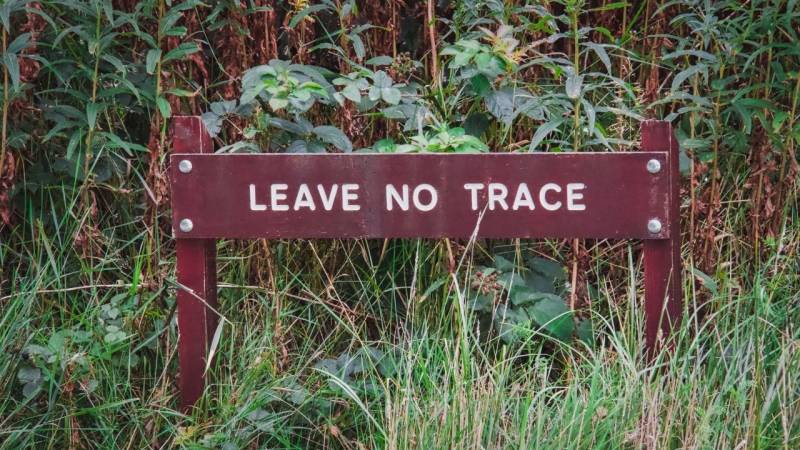
As campers, we should be responsible travelers who appreciate the wilderness and respect nature. Seasoned campers may already know this, but not everyone who is camping for the first time.
Therefore, never leave any waste behind at the campsite. Most campsites have trash bins where you can dispose of your garbage. However, if there are no trash bins available, pack your trash and take it with you until you can dispose of it properly.
If you have lit a campfire the night before, you should not leave the ashes and unburned wood behind.
Be a responsible traveler and leave the campsite as clean as you found it, or even better.
If you are camping in the wilderness without toilets, you should dig a hole for your human waste to go into.
And if you pee in the bushes, you shouldn't leave the tissue there. It's better to read my article "How to properly and sustainably go to the toilet in the forest".
Basically, you should never leave traces - no one should know that a human has been there. If we all do that, we can preserve the wilderness for future generations.
Read also
The 7 Leave No Trace Principles and their Application: Your Guide to Environmentally Conscious Outdoor Behavior – Discover how the Leave-no-Trace principle can revolutionize your outdoor experience. Protect what you love and read more about this environmental protection.
11. Not informing anyone about where you are going camping and when you plan to return
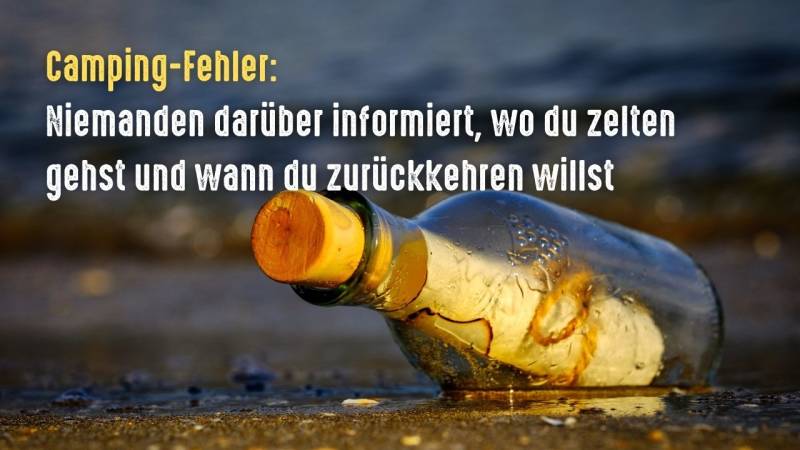
There is another major mistake when camping: Not informing anyone where you are going and when you will be back.
This can even cost you your life if you get into trouble and no one knows where to start looking.
Nature is fun, but it can also be dangerous. Especially when you're camping alone and don't have reception with your smartphone.
You should inform someone where you are going and when you plan to return. Only then will this person know where to look for you if you don't return to the scheduled time.
Reading tip: 7 things you should never do when camping alone
12. Not enough food taken
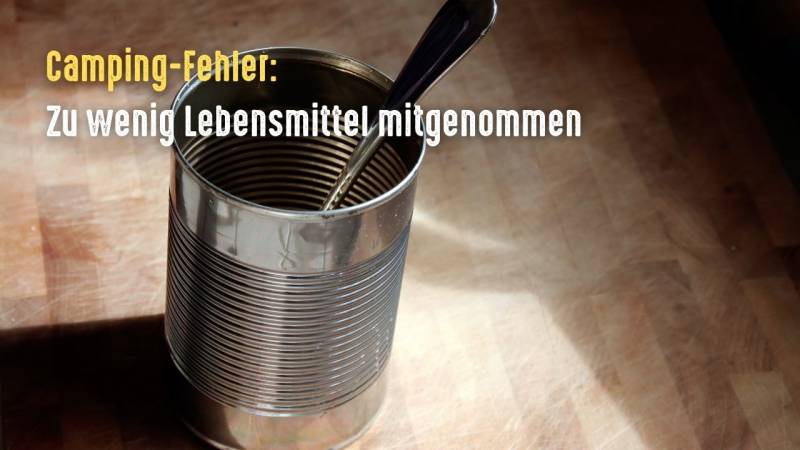
When camping, you should avoid taking too little food with you. It's frustrating when you run out of food even though the camping trip isn't over yet.
Even worse is when you can't buy anything anywhere nearby. Therefore, I advise you to plan your daily meals.
Plan what there is for breakfast, lunch, and dinner for the number of days you will be camping.
Moreover, pack extra food for an additional day to ensure that you never run out of food during your camping adventure.
Also, take along food that you can easily prepare and that have short preparation times. Some camping foods you can bring are:
- Rice
- Noodles
- Potatoes
- Tomato sauce
- Vegetables
And what shouldn't be missing for in between, like:
- Trail mix
- Granola bars
- Pretzels
- Sausages
- Cookies
- Dried fruits
Canned food is also a suitable option - but don't just pack fast food because when doing outdoor activities, you should also eat well and healthy.
Reading tip: What food can you take camping?
13. Did not bring a sleeping pad or air mattress
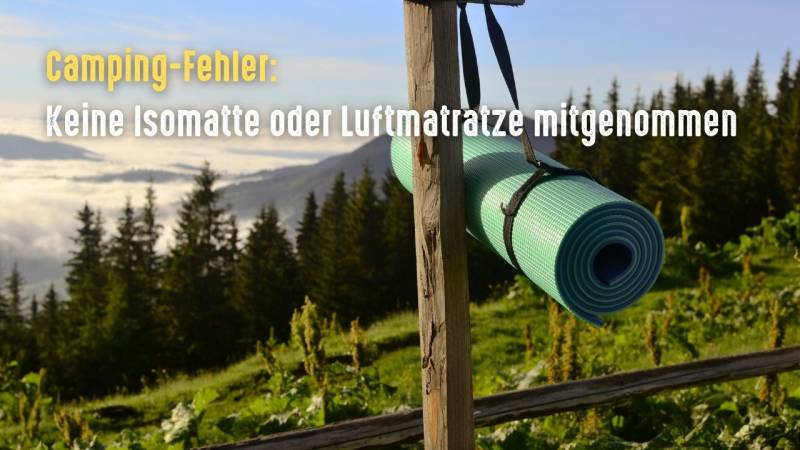
If you're missing your sleep equipment, you're in trouble, like robbing a bank without a mask.
Some think that a sleeping bag is enough, but that's not true.
An air mattress is an absolute must. It provides additional comfort as you won't be sleeping directly on the ground. And trust me, the ground is cool, even in summer.
Depending on how you travel, you can choose from several options:
- Sleeping pad
- Air mattress
- Folding mattress
- Camp bed
If you're traveling by car and don't have to worry about weight, I recommend a camping bed (something like this) or a folding mattress (like this one).
If, however, you are going camping as a backpacker without your vehicle, I recommend a sleeping mat. It is lightweight, so you can easily transport it in your backpack.
And if you want to sleep super comfortably while camping, I recommend a pillow (preferably an inflatable one).
All of these sleeping options have their advantages and disadvantages. For more information, please read my comprehensive guide: "How to sleep best in a tent?"
14. Kitchen utensils (stove and dishes) left behind
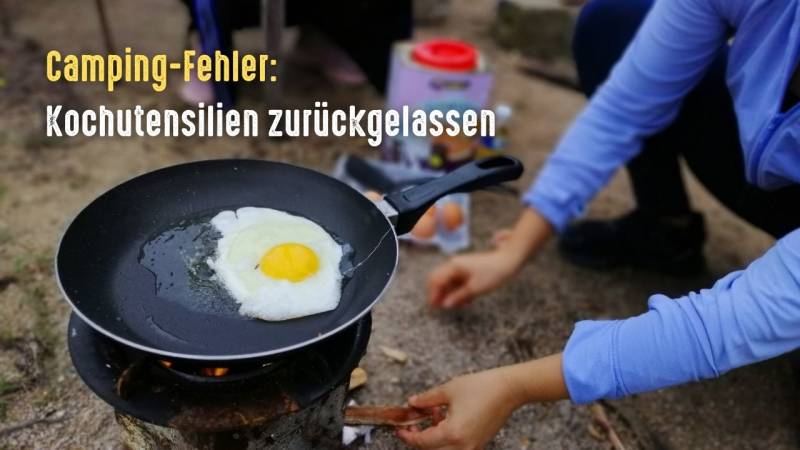
I have heard from some people who leave their cooking utensils behind when camping because they only want to cook over the campfire.
This is a big camping mistake that can lead to you going hungry on some days. (Unless you're a pro and have done it a few times already.)
Imagine you can't make a fire at the campsite because the weather is too bad. Or even worse: imagine there is no designated fire pit.
All of this clearly shows how risky it is to not bring any cooking utensils.
And even if all these conditions are met, it will take a while until you have lit a fire. Especially beginners are not familiar with campfires for cooking and overestimate themselves.
So take a gas stove with you when camping, on which you can easily prepare your meals without worrying about the weather.
In addition to the gas stove, there are other cooking utensils that you should take with you:
- Metal cup: This metal cup is perfect for a cup of coffee or tea in the morning or on cold nights, as it can't break.
- Tupperware: You'll need to store your food well, and a set of leak-proof Tupperware is perfect for that.
- Cutlery: Bring a fork, spoon, knife, and ladle.
- Stainless-steel cooking pots: If your camping trip is long, 2 or 3 pots will be enough.
- Plates: Don't forget to bring some plates. And don't forget the cutting board!
Also, don't forget that you have to clean the camping utensils after eating. So, bring soap, a washcloth, and a bathroom sink with you.
When packing your cooking utensils, remember that you only want to cook for a short time and pack only the essentials.
15. Poorly stored food
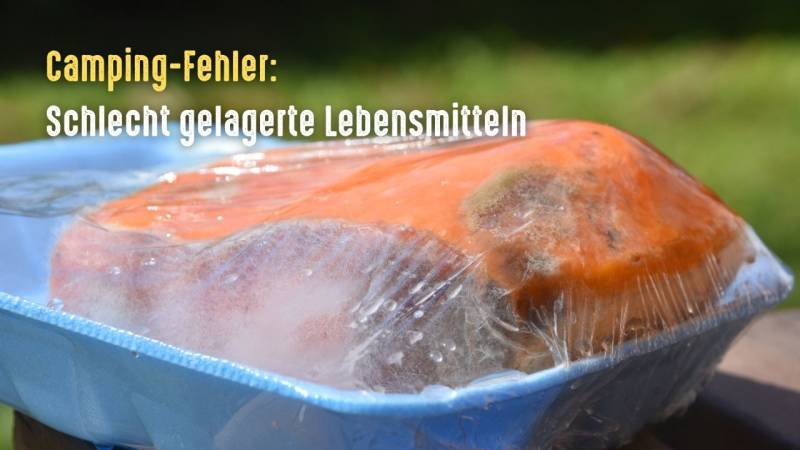
If we're already talking about cooking and food, it's of utmost importance that you store your groceries properly.
As I mentioned before, most simple camping foods are perishable. This means that they need to be kept in a cooler to stay fresh.
For this reason, you should bring a cooler box. Especially if you're going camping for a longer period of time. The rolling cooler box by Coleman is small, keeps ice for more than 4 days, and is easy to transport thanks to the wheels.
If you have leftovers, you can store them in various Tupperware containers and later transfer them to a cooler box.
But even without the food that doesn't require a cooler, you still need to store them properly.
Another useful but simple tip: Place the food you want to eat last at the bottom of the cooler box.
16. Forgot insect and tick spray
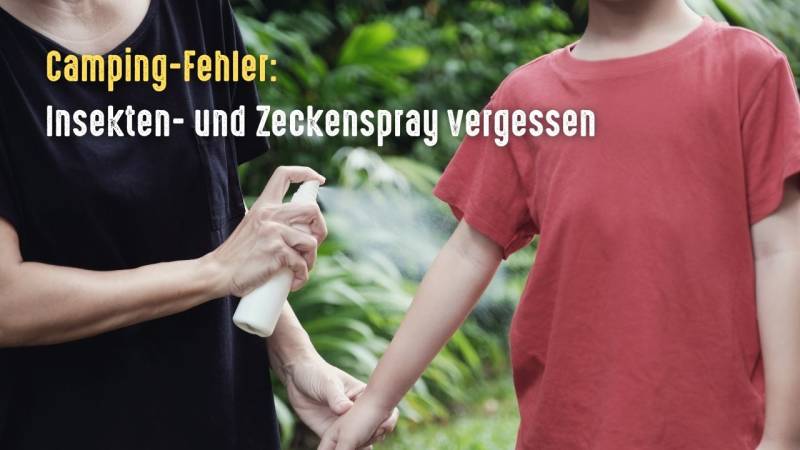
As with any other outdoor activity, you will need mosquito repellent.
I recommend bringing a general mosquito repellent if you are not familiar with the mosquitoes in the area.
But if your camping trip takes place in Asia, then you definitely need to bring an anti-mosquito repellent.
Don't you want to miss out on the cozy nighttime campfire because of the mosquitoes, do you?
And also think about the ticks, which are found almost everywhere in the world. A tick spray and a tick set are mandatory here.
If you are camping in an area with many bears, I recommend bringing bear spray to keep them away.
Reading tip: Ticks: How to protect yourself and remove them
17. Saved on lighting supply
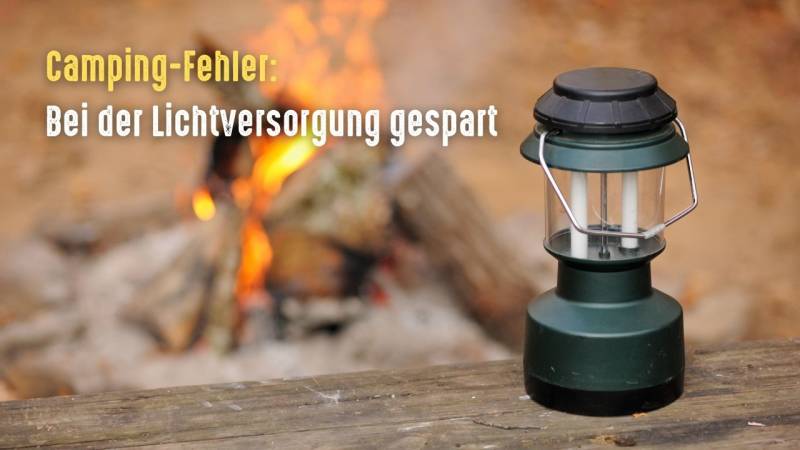
In my experience, many campsites do not have electricity or lighting near your tent.
So it would be a big mistake when camping not to bring enough sources of light.
A powerful headlamp is a must-have when camping. But you can also bring a battery-powered lantern (here's my top list) so that you always have light, even if you can't charge your flashlight.
Trust me, it's no fun being in the wilderness at night in complete darkness. Or owning a headlamp that only reaches 3 meters.
Light is therefore one of the most important camping utensils that you should not skimp on.
Tip: To recharge your light sources, you should bring a power bank. See my buying guide with top list for that.
18. Going to sleep with food in the tent
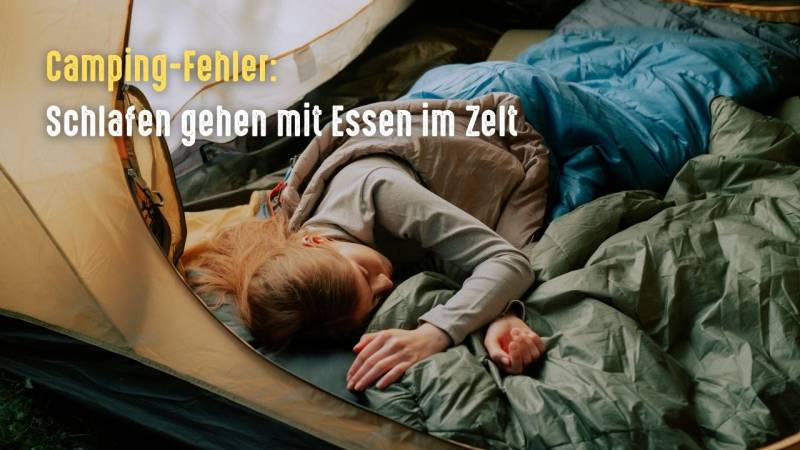
You mainly make this mistake while camping outside of Germany, but it can also be unpleasant here.
Sometimes the error can even be deadly, especially in countries where there are bears.
By eating in the tent, wild animals are attracted. And when they smell the food in your tent, they will want to access it.
You can't even imagine what could happen if a bear wants to get to the food in the tent.
But even raccoons and foxes can become exhausting when they dismantle your equipment.
Even though you should store your food properly, it is the worst idea ever to store it in the tent.
19. Not informed about the rules for pets at the campsite
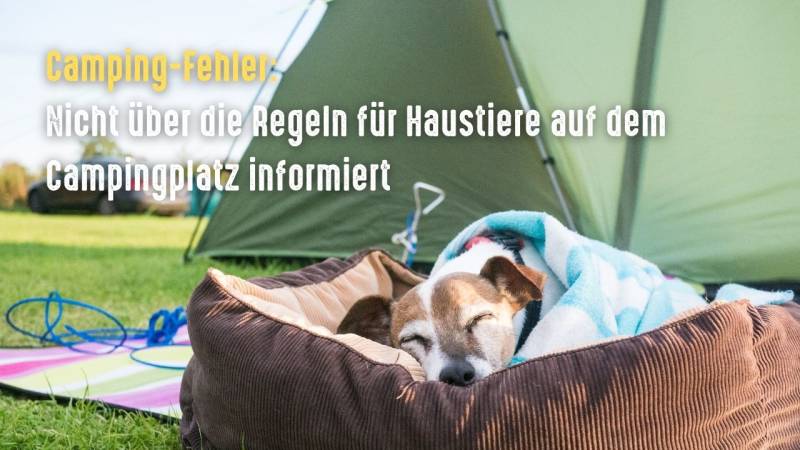
We all love to travel with our furry friends - and camping can't stop that.
As great as it is, not all campsites allow pets, such as dogs.
So before you pack your dog into the car, you should find out if the campsite allows pets.
If yes, ask about the rules that need to be followed and any relevant information.
And if your dog is not allowed, you can still consider choosing a different campsite.
It would be frustrating if you arrive at the campsite and get turned away because of your pet.
Reading tip: What do you need when camping with your dog? (with packing list for your dog)
20. The garbage situation not resolved
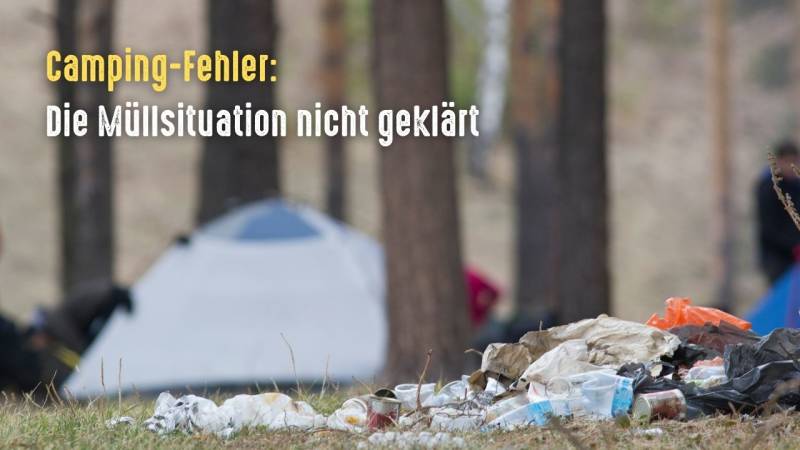
Another mistake when camping is leaving trash outside at night.
Even if he is wrapped in bags, one day the night will come when the raccoon fights with the garbage bag at 3 in the morning.
Wild animals are constantly seeking food, and they will try to find something in the trash.
Before you go to bed, make sure of the following:
- store your garbage in a way that it does not emit any odors
- store garbage in a location that wild animals cannot reach
21. Not enough water brought along
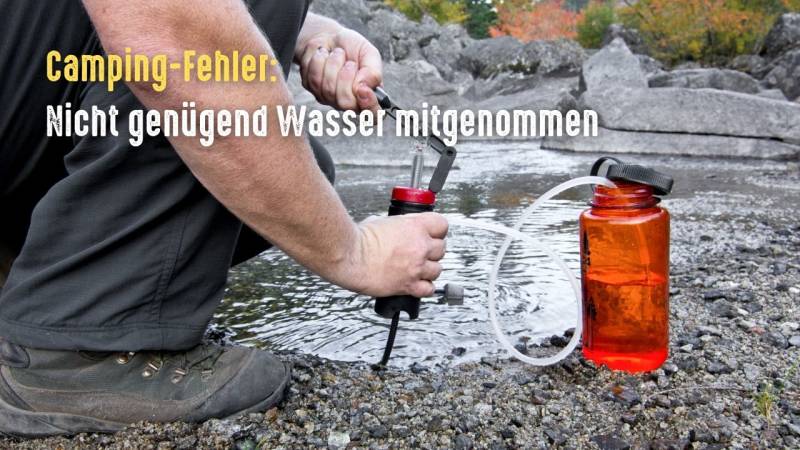
Imagine arriving at the campsite and it doesn't have a water connection.
So you should always research before your trip whether there is a water connection available.
If this is not the case, you will need to bring enough drinking water in a separate tank (preferably a 20-liter container). And not only that: you also need to account for water for other things, such as cooking, hygiene (Read more about outdoor hygiene here), and cleaning.
But even then, it is possible that the carried drinking water is not sufficient.
So be sure to bring a water filter with you so that you can easily filter any type of water and make it safe to drink.
22. Brought Firewood from Home
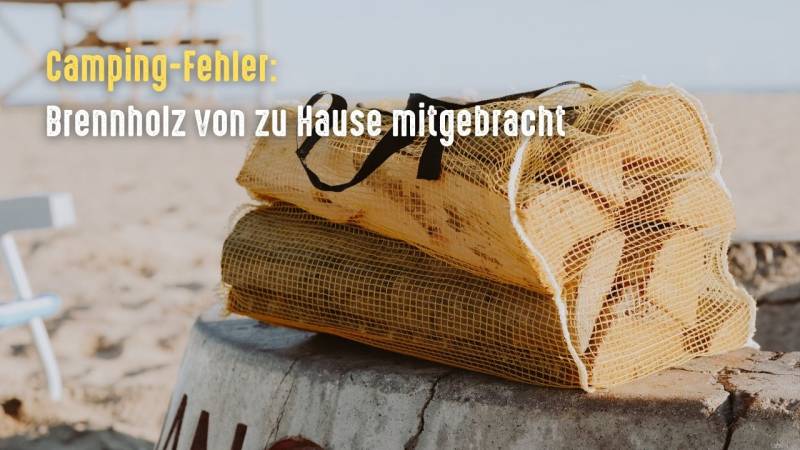
There are small things you should think about. They may be small, but they can have big impacts.
Non-native pests and other pests that are introduced with firewood can bring invasive species to areas and impact the ecosystem.
So make sure to inquire in advance whether firewood is sold at the campsite. Or if collected and burned, wood can be used near the campsite.
If not, plan a stopover at a grocery store, gas station, or hardware store near the campsite.
23. Meals not carefully planned

Planning meals in the great outdoors requires some effort.
If you don't plan them well, you will probably forget ingredients at home. Or they will spoil because you don't prepare them early enough.
Here are some tips for planning your camping meals:
- Cook simple meals on the day of arrival (or cook in advance and just reheat)
- First plan meals with the most perishable ingredients (like raw meat)
- Freeze what will be needed later on the trip and let it thaw slowly - this will keep the food longer
- Compare your meal plan with the kitchen and cooking equipment to make sure you have everything you need
- Have a plan in case the campfire doesn't work
Reading tip: Take a look at my simple and delicious outdoor recipes
24. The campfire not completely extinguished
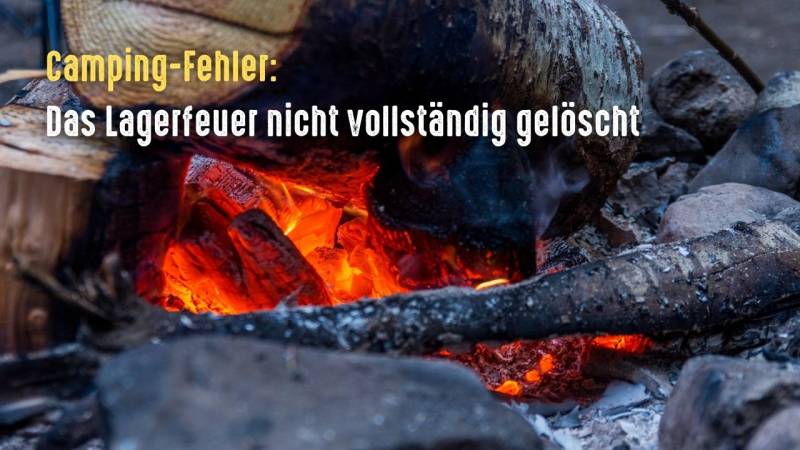
If you don't extinguish your campfire, it can pose a major safety issue.
Especially in hot, dry weather, this is highly dangerous.
When there are only a few embers left after an evening by the campfire, it is still important to extinguish the fire with plenty of water.
A small spark can jump out of the fire faster than you think. And this spark then ignites a fire while everyone is fast asleep in their tents or motor homes.
How to avoid this: Always extinguish the fire, even if you think it's out. Just in case there are still one or two embers remaining.
And if there is a fire: You can extinguish it with water, sand/soil, or a thick blanket.
25. Unrepaired or Unreplaced Equipment
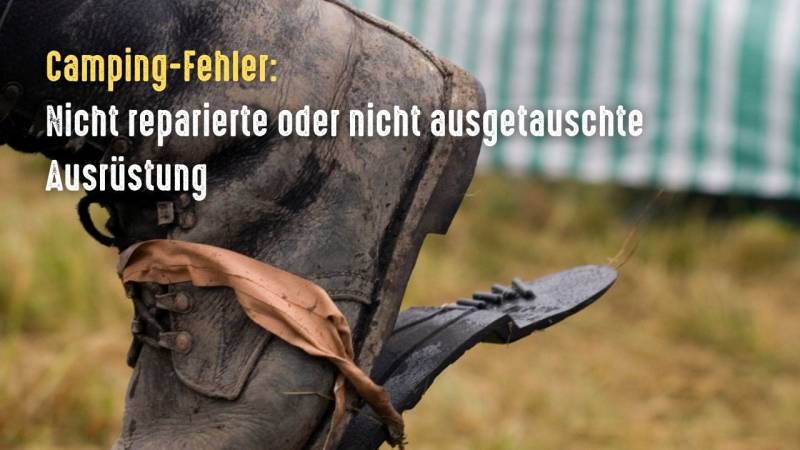
Often I have helped others out of a jam because I had spare equipment with me or my equipment was in perfect condition.
What I have often seen:
- The flashlight with empty batteries
- A crack in the tent
- The broken sleeping mat
- The empty gas cartridge
- The broken tent peg
- The torn guy line
- A roll of toilet paper with only a few sheets left
Beginners often don't think to check these details as we go through our checklist for the next camping trip. And so you keep camping with the same useless equipment.
These were some of the most important mistakes you should avoid while camping, especially if it's your first time.
If you follow them, your journey will definitely be a great camping experience.
And finally, you should not forget to enjoy every part of the journey. There will always be challenges, no matter the situation, but they make us better campers.
Remember that your first time camping may not go as smoothly as you imagine. But over time, you will get better.
And if you make mistakes, don't let them ruin your camping trip, but learn from them.
Have you made any of these common camping mistakes? Write it in the comments.


Author of the guide
Martin Gebhardt
Hey, I'm Martin. On my blog, you will learn the basics and numerous details about living in the wild. I think survival, bushcraft and the good life in nature are the keys to happiness. Find me here on Instagram or on YouTube. You can find more about my mission on the About Me page.
Was this guide helpful?
11 people found this guide helpful.
5.00 out of 5 points (11 Ratings)
Comments (0)
This post may contain affiliate links. So if you click on the links and make a purchase, I will receive a small commission at no additional cost to you. Click here, to learn more about it.


